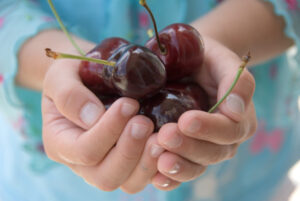Yesterday I had the privelege of attending a lunch at Soul in Auckland where Michael Pollan was guest speaker. I have previously read his book The Omnivore’s Dilemma which was incredibly thought provoking and I have just started his latest book In Defence of Food.
Michael in his own words is a naturist before food writer and his connection with food is based on the way our food choices impact on nature.
Some thought provoking comments that I took the time to write down from Michaels talk include:
* His 7 word thoughts on eating – Eat food, not too much, mostly plants.
* Don’t eat anything your great grandmother (or anyone elses great grandmother) didn’t recognise as food.
* Nutritionism divides the world of food into “good and evil” and constantly changes their thoughts over time.
* One of the most important votes you can cast is the one you make with your fork on a daily basis.
* Eating used to be a normal activity, now it seems we need experts to tell us what to eat.
* Agriculture changes the species existing in the world.
* Don’t eat anything incapable of rotting – with a few exceptions like honey.
* Do your shopping around the outside of the supermarket without spending too much time (or money) within the aisles.
I think these points are very thought provoking and it seems that we are straying so far away from real food that we need to be reminded to think before we eat.
What do others think?






Have just read the article from summerfield foods on the earthquake, they were prepared, which I found I wasnt.
No power and no means to cook food or heat water. I have now started putting together a kit starting with a charcoal barby not pc but effective if you have no gas. I can use natural resources such as wood if no other material available. Im going to collect effective cooking utensils that will heat guickly and efficiently. As for food it will be cans and water, bucket and plastic bags, transitor radio, torch and matches.
I am just reading a great book called We want Real food by Graham Harvey. In it he expounds the virtues of high quality soil to grow high quality crops. He says in the book that the soil becomes exhausted with intensive agricultural practices, and is stripped of its essential minerals. Therefore the crops that are produced dont have the minerals in them. Deficient soil, deficient crops.
This was brought home to me when I was talking to an organic farmer who had his farm for over 20 years, and the soil was dark, fine and free of clumps. When we looked over at his neighbour that farmed intensively, his soil was grey full of clods, and clumped together. I know where I would rather my vegetables be grown.
I do enjoy your Saturday session on ‘live’ and have taken on board lots of your hints – thanks
Party Vote Green! Sue Kedgley is a champion of good honest food
Lynley I would also like to see some government support into identifying what constitutes free range and checking to ensure anyone labelling as such is legitimate. AND most importantly the free range farmer shouldn’t have to pay a whopping amount for this as they do with organic accreditation. It amazes me that we penalise people who are trying to give us good quality produce rather than encourage them.
but surely to buy (or grow your own) Organic products where you can ensures sustainability and conscientious accountable practices – not everyone is as conscientious as Greg.
I was horrified recently to drive past a truck loaded with tiny crates and in each was a chicken – there were 1,000’s of them – I also flew over south Auckland and saw 100’s of huge factory-like warehouses with enormous fans at either end – we all know they are packed full of wretched chickens being fed god knows what, Organic certification doesn’t allow these barbaric practices, and ensures sustainability.
I read the Omnivore’s dilemma also and I know that there are Organic Factory farms also – but I truly believe that if Organic Production was the norm we would all be so much better off for a lot longer – and we would have no choice….
time we all started making a difference instead of paying lip service
buy local
eat organic
grow your own
compost your waste
Greg I do agree.
I think that conscientious sustainable agriculture and horticulture is actually more important than thinking purely organic.
I did mean to ask Michael that point while interviewing him on Saturday on Radio but we very quickly ran out of time.
Helen,
As you know from the foodlovers forum, I grow much of what my family eats and run quite a successful, albeit small farm market. I am also reading In defense of food, after reading Omnivores dilemma.
I have not found anything to refute any of author Pollens ideas, (except he did say the price of corn would drop as all the farmers would run to plant it, but we didn’t know then that we would not only eat it, but now we burn it for fuel) and recommend his book(s) to many of my clients.
We are not organic farmers, but I would like to feel we are conscientious conventional farmers. Sometimes I feel the public sees a conventional farmer as anti-organic, when that is in many cases far from the truth. Science has come a long way since the days of DDT, and there are a lot of safe ways to conventionally farm vegetables, without poisoning the people that eat it. My only wish is that there would be a middle ground, somewhere between ultra organic and ultra chemical based conventional farmers. Most of my customers think organic is pesticide free, and herbicide free, when in truth there are many organically certified pesticides and herbicides, which are used on organic crops. They are supposedly safe, but nonetheless, there is use of pesticides and herbicides in organic farming.
On the conventional side, there is the over use of pesticides and herbicides, with the only intent of having a good looking and profitable crop.
We raise almost all our own veggies, have chickens and eggs, raise and butcher our beef, and have our own hives for honey. Not everyone can do this. We enjoy it and make a profit from selling some of it, but what we sell is what we eat, and it is conventionally grown (conscientiously conventionally grown).
My whole point in writing this is that I hope the public in buying vegetables does not feel bad when they don’t buy organic only, because there is a lot of safe conventionally grown produce. By following the points you have forwarded from your luncheon, people can make healthy choices in their diets, whether organic or conventional.
Greg Johnson
Laurel Farmers Market, Montana, USA
He is absolutely right but the frightening thing is that it is all just common sense! We live in a crazy world where best selling books are written reminding us “to think before we eat”. We also seem to be fast losing the ability to prepare good, wholesome food from scratch – especially salient now food prices are rising (and will continue to rise). What have we done to our world?